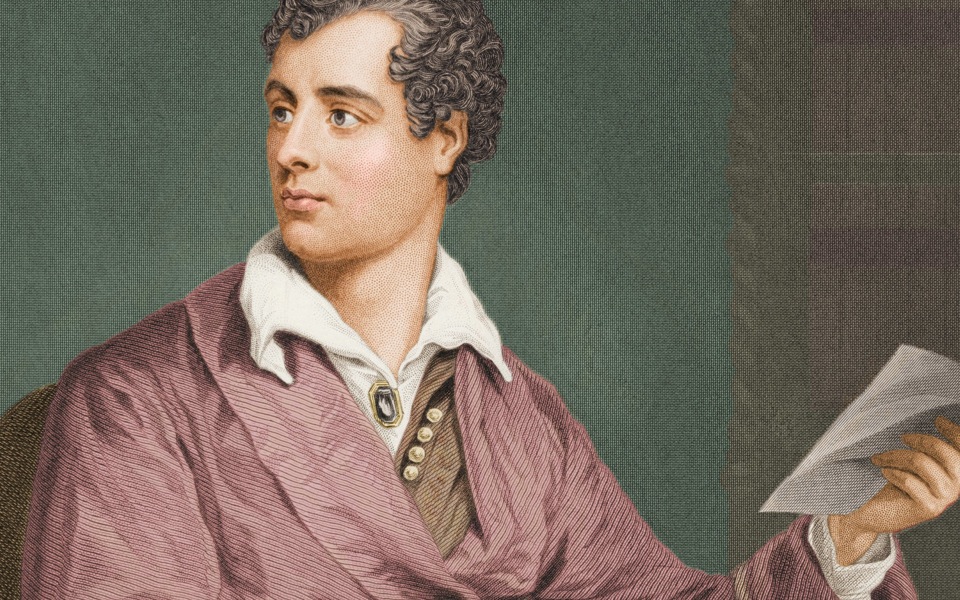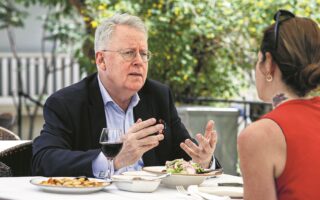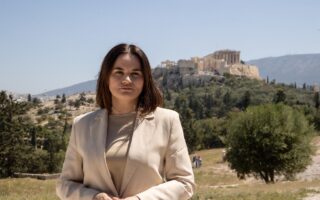‘Britain and Greece have a co-ownership of Byron’

“Britain and Greece have a co-ownership of Byron; in Britain as a foremost poet and in Greece as someone associated with Greek liberation,” says Lord Lytton, a fourth-generation descendant of Lord Byron, in a special edition of Kathimerini. With roots in European aristocracy stretching back to William I of England, Lord Lytton – or by his full title, John Peter Michael Scawen Lytton, fifth earl of Lytton and 18th baron of Wentworth – explores Lord Byron’s varied life, his voyages to Greece and his contribution to spreading the cause of Greek independence.
On the occasion of the 200th anniversary of the great Romantic poet’s death and the forthcoming international Byronist conference (July 1-7), organized by the Messolonghi Byron Society, Lord Lytton highlights Lord Byron’s strong connection with Greek tradition and the spiritual legacy he bequeathed to his readers. In this way, the “rebellious attraction” in Byron’s poetic treatises constitutes the cultural link between Greece and the United Kingdom.
“I should not like to give the Greeks but a half helping hand.” Lord Lytton, starting our discussion with this quote from Lord Byron to his business agent in England, I would like to shed some light on the background of your family and unravel unknown aspects of Lord Byron’s life.
The Lytton family goes back to the time of the William the Conqueror and so is of very ancient and honorable strain, but the Byron line, which goes back to the conqueror also was, to say the least, more chequered with Admiral “Foulweather Jack” being Byron’s grandfather. Byron’s father “Mad Jack” also squandered his inheritance, meaning that Byron and his mother lived in relative poverty during his early years until eventually succeeding to the Byron barony and some landed estates including the iconic Newstead Abbey.
The wife of Byron, Annabella Milbanke, came from a well-to-do family. Byron and Annabella married in January 1815 and had one child between them, Augusta Ada; it is well known the marriage was tempestuous and, following their separation, the pressures on Byron were such that he left England forever.
In 1835, Ada married William King, and a few years afterward he was made earl of Lovelace. Coming down the generations we come to William and Ada’s children Byron Viscount Ockham, who died young, Ralph, whose line died out, and a daughter, Anne Isabella, who was a skilled linguist, artist and musician. Anne married the diplomat, poet and traveler Wilfrid Scawen Blunt and they were notable for their travels in the Middle East, as horse breeders and in his case political agitation!
They had one surviving child, my grandmother, Judith, who married Neville Lytton, younger son of Robert Lytton, first earl, former viceroy of India and statesman, thus merging the descendants of the poet with the Lytton lineage. They had three children; the eldest, my father was born in 1900 and I was born 50 years later. My two aunts had no children. So, Byron is my three times great grandfather.
In your view, why did Lord Byron decide to settle in rebellious Greece, which he adored – something that is reflected in his works?
I would have to say that I am not an academic expert on Byron. But I think that Byron was attracted by the thought of rebellion. So rebellious Greece probably had a particular attraction for him. There is a letter that Byron wrote to Andreas Londos on January 18, 1824 in which he states: “Most esteemed sir and friend, the sight of your handwriting gave me the greatest pleasure Greece has ever been for me, as it must be for all men of any feeling or education. The promised land of valor, of the arts, and of liberty throughout the ages, and the journeys I made in my youth amongst her ruins certainly had not diminished my love for Greece, for the hero’s native land. In addition to this, I am bound to you by ties of friendship and gratitude for the hospitality which I experienced from you during my stay in that country of which you are now become one of the defenders and ornaments. Seeing you again and serving your country at your side and under your eyes will be one of the happiest moments of my life.”
And then he signs off that letter, “your most devoted friend and servant, Noel Byron.” So that, I think, encapsulates what he felt about Greece at that time.
Lord Byron wrote about Greece, conveyed the pain and struggle of the rebellious Greeks, and stood by the Greeks by donating thousands of British pounds. In your opinion, how did Byron’s works help the cultural and political development of England and Greece?
Byron was already an established poet and known for his speaking up for the oppressed and for Catholic emancipation. His less creditable reputation in respect of his private life and lifestyle both shocked and fascinated the establishment in equal measure; but above all he was consistently loyal to the causes he espoused and his innate skill as a poet often reflected so much of what was going on with him personally and more widely. So, my own feeling was that this captured the imagination of the supporters of Greek liberation and was instrumental in making the work of the Greek Committee relevant in having their man of action on Greek soil.
In this way, Britain and Greece have a co-ownership of Byron; in Britain as a foremost poet, and in Greece as someone associated with Greek liberation. And I should add that I am always delighted with the continuing family links with Greece and its people.
Lord Lytton, speaking on a personal level, what are the difficulties and challenges of carrying the legacy of one of Britain’s greatest poets, especially in a rapidly changing world that tends to ignore its history?
One of the challenges is that people suppose as a descendant one must be an expert on one’s ancestors’ lives but Byron was not on the school curriculum in my early years and I didn’t get to study his poetry until adulthood. Although I have a lot of books on Byron, there are so many expert modern biographies that I have not read half of them! My family controls a significant collection of Byron’s private correspondence now lodged with the Bodleian Library and that is something I cherish.
In recent times some of the family papers of Byron’s daughter, Ada, countess of Lovelace, have been brought to prominence due to her understanding of and involvement with the earliest thinking on computer science and so I have been pleased to have assisted in some very worthwhile projects digitizing parts of that archive.
But it doesn’t worry me to be sharing an ancestor with the wider public; there is so much in his poetry and ideas that is imaginative, multi-layered, and indeed modern in his thought and I hope he will go on being appreciated.
This year marks the 200th anniversary of the death of the great Romantic poet. Through the dozens of works in Lord Byron’s short life, what do you hope future generations will remember or learn about him? In your opinion, which phrases and lessons from his works should be included in school curricula?
Well of course I think Byron’s works should be more widely studied but educationalists tell me that it is not really suitable until further education levels, which really means it is at university that the main study of his work begins. It’s difficult to pick out a specific phrase that suits our time because so many of them have to be taken in the context of their time, the politics of the day, religious and social norms. However, and although I take it out of context, I do rather like his quip “There is something pagan in me that I cannot shake off. In short, I deny nothing but doubt everything,” and in this era of declining religious observance, AI, fake news, alternative facts and so on, that seems to have current relevance.
In 2023 the Messolonghi Byron Society nominated you as its honorary president. This year the International Byron Conference will be held in Athens and in Messolonghi. Today, as a direct descendant of Lord Byron, what is the relationship of your family with Greece and what universal values and messages of global philhellenism do you consider to be reflected in the work of your ancestor?
I am very honored to have been made an honorary president of the Messolonghi Byron Society. And of course, my wife and I are very much looking forward to visiting Greece in July and celebrating with our friends and Byronists this very special anniversary year.
My family has very many happy memories of holidays in Greece and really I regard myself as a tourist and not a social or political commentator on Greek affairs but I know that Greece has had many difficulties but also the Greek people have great courage and resilience and I admire them for that. Greece is a great wellspring of historical remains, classical culture, and political thought, and in modern times offers a wonderful climate, beautiful landscape, azure seas, great cuisine, and always a warm welcome that attracts visitors today. Greece remains an inspiration and a place that promises uplifting of the spirits just as it was for Byron.
The Byron connection has enabled me to make many friends in the academic and wider community of Byronists across the world and encounter thinking and cultures that show the message of Byron is universal and his poetic intelligence far beyond the bounds of the world as he experienced it.
In our times the value of philhellenism lies in the fact that it connects the idea of solidarity with Greece, with the sort of solidarity that we ought to have with our neighbors. In modern times, we are not so interconnected now and we should largely be cooperating. And I see that as the sort of modern expression of philhellenism, which is taking the best of the past and forging it into a way forward for the future.
Ιf you had to choose a phrase or quote from Lord Byron’s works about Greece, what would it be?
The one that comes to mind is, “If I am a poet, the air of Greece has made me one.” There are many other quotes but too many of them lament the loss of the past greatness of Greece, whereas I hope that modern Greece looks forward with confidence; but I think even then Byron could sense that potential when he wrote in “The Isles of Greece”: “Fill high the bowl with Samian Wine! On Suli’s rock and Parga’s shore, exists a remnant of a line such as the Doric Mothers bore; And there, perhaps, some seed is sown, the Heracleidan blood might own.”
And so he was saying that Greeks had still got this ancient bloodline in there and this little bit of genetic stuff from way back. And he was really saying that Greece still has this sense of identity, which is still identifiable, because, you know, the inheritors and the great heroes of the past, and that is a lesson for all of us.





